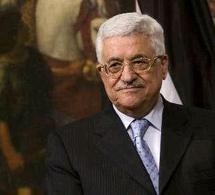
Palestinian president Mahmud Abbas
As Mitchell was meeting Israeli Defence Minister Ehud Barak, the US State Department said it expected that direct talks would nevertheless resume sooner or later.
"I think we have a strong belief that at some point in time direct negotiations will be renewed," spokesman Philip Crowley told reporters in Washington.
"Whether that's days from now, weeks from now, I don't think we're in a position to say at this point."
That was a more cautious statement than those emanating from the White House last week when both Obama and visiting Israeli Prime Minister Benjamin Netanyahu said they hoped talks would be relaunched before an Israeli moratorium on settlement construction in the West Bank expires in September.
In a July 7 interview on CNN television, Netanyahu challenged the Palestinian president to meet him face-to-face "right now, today, tomorrow, in Jerusalem, in Ramallah (his West Bank base) or anywhere else."
The Palestinians suspended direct talks in December 2008 after Israel launched a devastating offensive against the Gaza Strip and Abbas has said he will not renew them until there is progress on the contentious issues of borders and security.
"The lack of credibility and confidence resulting from the Israeli rejection of the indirect talks, which have achieved no progress, will become entrenched as 'givens and facts' if there is a transition to direct talks," Abbas's Fatah movement said on Thursday.
"That is something the Palestinian leadership has not and will not accept," it added.
Despite his public calls for direct talks, many Palestinians doubt that the hawkish Netanyahu and hardliners in his coalition government are ready to withdraw from the West Bank, including annexed Arab east Jerusalem -- Palestinian lands captured in 1967.
In a letter addressed to Mitchell, Palestinian chief negotiator Saeb Erakat slammed recent decisions to expand Jewish settlements in east Jerusalem and other "illegal and provocative" Israeli policies.
He went on to accuse Israel of "flagrant violations" of past agreements going back to the 1990s.
Mitchell arrived in Israel on Thursday and met Barak during the evening.
Over the weekend, he is due to meet Netanyahu in Jerusalem and visit Abbas at his headquarters in the West bank town of Ramallah.
As with previous visits, he has not publicly discussed his plans and is not expected to reveal details of his talks.
---------------------------------------------------------------------------------
"I think we have a strong belief that at some point in time direct negotiations will be renewed," spokesman Philip Crowley told reporters in Washington.
"Whether that's days from now, weeks from now, I don't think we're in a position to say at this point."
That was a more cautious statement than those emanating from the White House last week when both Obama and visiting Israeli Prime Minister Benjamin Netanyahu said they hoped talks would be relaunched before an Israeli moratorium on settlement construction in the West Bank expires in September.
In a July 7 interview on CNN television, Netanyahu challenged the Palestinian president to meet him face-to-face "right now, today, tomorrow, in Jerusalem, in Ramallah (his West Bank base) or anywhere else."
The Palestinians suspended direct talks in December 2008 after Israel launched a devastating offensive against the Gaza Strip and Abbas has said he will not renew them until there is progress on the contentious issues of borders and security.
"The lack of credibility and confidence resulting from the Israeli rejection of the indirect talks, which have achieved no progress, will become entrenched as 'givens and facts' if there is a transition to direct talks," Abbas's Fatah movement said on Thursday.
"That is something the Palestinian leadership has not and will not accept," it added.
Despite his public calls for direct talks, many Palestinians doubt that the hawkish Netanyahu and hardliners in his coalition government are ready to withdraw from the West Bank, including annexed Arab east Jerusalem -- Palestinian lands captured in 1967.
In a letter addressed to Mitchell, Palestinian chief negotiator Saeb Erakat slammed recent decisions to expand Jewish settlements in east Jerusalem and other "illegal and provocative" Israeli policies.
He went on to accuse Israel of "flagrant violations" of past agreements going back to the 1990s.
Mitchell arrived in Israel on Thursday and met Barak during the evening.
Over the weekend, he is due to meet Netanyahu in Jerusalem and visit Abbas at his headquarters in the West bank town of Ramallah.
As with previous visits, he has not publicly discussed his plans and is not expected to reveal details of his talks.
---------------------------------------------------------------------------------









 Home
Home Politics
Politics









